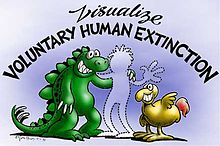Voluntary Human Extinction Movement
Although the group is promoted by a website and represented at some environmental events, it relies heavily on coverage from outside media to spread its message.
Many commentators view its platform as unacceptably extreme, while endorsing the logic of reducing the rate of human reproduction.
Others maintain that whatever the merits of the idea, the human reproductive drive will prevent humankind from ever voluntarily seeking extinction.
[2] After becoming involved in the environmental movement as a college student in the 1970s, Knight attributed most of the dangers faced by the planet to human overpopulation.
[18] Knight believes that Earth's non-human organisms have a higher overall value than humans and their accomplishments, such as art: "The plays of Shakespeare and the work of Einstein can't hold a candle to a tiger".
[19] He maintains that the standard of human life will worsen if resources are consumed by a growing population rather than spent solving existing issues.
[6] A 1995 survey of VHEMT members found that a majority of them felt a strong moral obligation to protect the Earth, distrusted the ability of political processes to prevent harm to the environment, and were willing to surrender some of their rights for their cause.
[3] Writing in the San Francisco Chronicle, Gregory Dicum states that there is an "undeniable logic" to VHEMT's arguments, but he doubts whether Knight's ideas can succeed, arguing that many people desire to have children and cannot be dissuaded.
[6] Stephen Jarvis echoes this skepticism in The Independent, noting that VHEMT faces great difficulty owing to the basic human reproductive drive.
[3] At The Guardian's website, Guy Dammann applauds the movement's aim as "in many ways laudable", but argues that it is absurd to believe that humans will voluntarily seek extinction.
[25] Freelance writer Abby O'Reilly writes that since having children is frequently viewed as a measure of success, VHEMT's goal is difficult to attain.
[3] The Roman Catholic Archdiocese of New York has criticized Knight's platform, arguing that the existence of humanity is "divinely ordained".
[19] The Economist characterizes Knight's claim that voluntary human extinction is advisable due to limited resources as "Malthusian bosh".
[2] Sociologist Frank Furedi also deems VHEMT to be a Malthusian group, classifying them as a type of environmental organization that "[thinks] the worst about the human species".
[21] In response to Knight's platform, journalist Sheldon Richman argues that humans are "active agents" and can change their behavior.
[16] Alan Weisman, author of The World Without Us, suggests a limit of one child per family as a preferable alternative to abstinence from reproduction.
